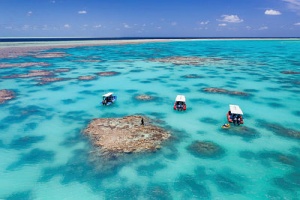Qantas & Great Barrier Reef Foundation Collaborate to Restore Coral Reefs and Combat Climate Change

Qantas and the Great Barrier Reef Foundation have announced a new fund that will help accelerate the restoration of Australia’s reef systems, including investment in Coral IVF programs, corals with increased heat tolerance and world-first portable coral nurseries.
Building on a 15-year partnership with the Foundation, Qantas will invest $10 million over 10 years in the Reef Restoration Fund to support scientists, Traditional Owners and local tourism operators restoring corals across the Great Barrier Reef and other iconic Australian coral reefs.
Great Barrier Reef Foundation Managing Director Anna Marsden and Qantas Group Chief Sustainability Officer Andrew Parker announced the partnership at the Australian Institute of Marine Science’s National Sea Simulator in Townsville.
Ms Marsden said: “Australia is the guardian of some of the most iconic coral reefs in the world. It’s a huge responsibility and we’re proud to see one national icon supporting another. This partnership will help fund critical actions at a critical time.
“Coral reefs are the beating heart of our oceans. They’re a nursery and safe haven for a quarter of all marine life and support a billion people worldwide. But the Great Barrier Reef, and coral reefs around Australia and the world, cannot adapt fast enough to warming ocean temperatures, making them one of the most vulnerable ecosystems on the planet. We must help safeguard their future from the impacts of climate change.
ADVERTISEMENT
“We’ve made more advances in coral reef restoration science in the past five years than we have in the past five decades. Over the life of the partnership we’re committed to finding opportunities to share these learnings with Australia’s other coral reefs.”
Mr Parker said the partnership is a key element of the national carrier’s Nature Action Plan, which launched today.
“Connecting our customers with natural landscapes is at the core of what we do, including carrying millions of people to the reef each year,” said Mr Parker.
“We know that aviation is a high emissions industry, which is why we were one of the first airlines globally to commit to net zero emissions by 2050. We want to take the same leadership in addressing our impact on nature so that future generations can enjoy all the opportunities that global travel offers for years to come.
“By establishing the Reef Restoration Fund with our trusted partner of 15 years, we’re helping accelerate the development of world-leading technologies and projects to restore some of our most critical ecosystems.
“It’s part of our commitment to address nature and biodiversity loss by reducing the impact of our operations and supply chain, supporting the broader restoration of nature and advocating for cross-sector transformation.
“These commitments are just the first step. We are also developing rigorous nature-related targets and plans on how we’ll achieve them, which we expect to release by the middle of next year,” added Mr Parker.
Reef Restoration Fund
The Fund will help expand restorative work happening today across the Great Barrier Reef as well as research that will regenerate corals in the future.
In the first two years, the projects that will be funded include:
Boats4Corals: The Reef Restoration Fund will help expand the Boats4Corals program that trains local tourism operators, Traditional Owners and researchers in the novel coral restoration technique known as Coral IVF and launch it in new reef locations.
Coral Nurture Program: Through the Coral Nurture Program, researchers and reef tour operators work together to replenish reef sites. The Fund will strengthen tourism research partnerships in the Cairns region and support the transition to a sustainable model after three years.
Reef Restoration Adaptation Program (RRAP): RRAP is pioneering new solutions that will help coral reefs resist, adapt to, and recover from warming ocean temperatures. The Fund will support the technology transformation stream of RRAP to accelerate the deployment of corals with enhanced heat tolerances.
Reef Seed: The Australian Institute of Marine Science (AIMS) is developing world-first portable coral nurseries in shipping containers that can grow and plant 100,000 corals each year. Through the Fund, the first Reef Seed will be deployed on the Great Barrier Reef with the support of Traditional Owners and local tourism operators. See images of the Reef Seed system currently in design and development here.
For further detail on the Great Barrier Reef Foundation and Reef Restoration Fund, click here. https://www.qantasnewsroom.com.au/wp-content/uploads/2024/03/REEF-RESTORATION-FUND.pdf

